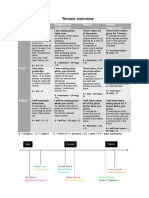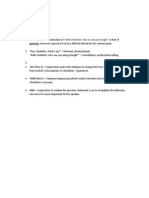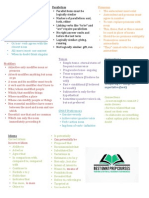Tiempos Verbales & Sus Usos
Tiempos Verbales & Sus Usos
Uploaded by
Allan BertrandCopyright:
Available Formats
Tiempos Verbales & Sus Usos
Tiempos Verbales & Sus Usos
Uploaded by
Allan BertrandCopyright
Available Formats
Share this document
Did you find this document useful?
Is this content inappropriate?
Copyright:
Available Formats
Tiempos Verbales & Sus Usos
Tiempos Verbales & Sus Usos
Uploaded by
Allan BertrandCopyright:
Available Formats
TIEMPO
(Simple)
ESTRUCTURA USO EJEMPLOS
PRESENTE
SIMPLE
Afirmativa:
Subject + present conjugation of verb
I play tennis on Mondays.
Negativa
Subject + DO not + base form of verb
They don't work in New York.
Pregunta
(Wh?)+do+subject+base form of verb ?
Does she know him?
Acciones habituales
Opiniones y estados de mente
Situaciones permanentes o de larga
duracin. Hechos y verdades generales
Sentimientos
Horarios y programas
Expresiones de tiempo presentes
comunes: usually, always, often,
sometimes, on Saturdays, at weekends,
rarely, on occasion, never, seldom.
I usually get up at 7 o'clock.
I think he is a wonderful student.
She lives in New York.
The Earth goes around the Sun.
I love walking around late at night.
The plane leaves at 4 p.m.
She doesn't often go to the cinema.
PASADO
SIMPLE
Afirmativa
S+V in past (regular, irregular):
She went to Paris last week.
Negativa
Subject + DID not + root of the verb.
They didn't drive to work.
Pregunta
(Wh?) did + subject + root of the verb?
Where did she get that hat?
Acciones acabadas que ocurren en un
momento definido en el pasado.
Con la palabra ago
Para expresar acciones cortas y
consecutivas Cuando hay dos acciones
simultneas, una de ellas suele ser ms
corta (simple) e interrumpe a la accin ms
larga (continuo).
I went to Paris last year
He stopped drinking alcohol 3 years ago.
I fell down and someone helped me.
The light went out (short action) while
we were having dinner (long action)
FUTURO
SIMPLE
Afirm.: Subject+ WILL+ base form of verb +
object(s)
I will meet you at the airport tomorrow.
Negat: Subject+ will + not base form of verb +
object(s)
He will not be able to come.
Pregunta: (Wh?) + will + S + infinitive of verb?
Will they visit us soon?
Decisiones espontneas tomadas en el
momento sobre el futuro. Predicciones
futuras (sin evidencias)
Promesas futuras, ofrecimientos, ayudas
y sugerencias.
That's difficult! I'll help you with the
problem.
She won't win the game.
Will you marry me?
Ill make you a sandwich
TIEMPO
(Continuo)
ESTRUCTURA USO EJEMPLOS
PRESENTE
CONTINUO
Afirmativa:
Subject + verb be (AM / IS / ARE) in
present + verb ing
He's working at the moment.
Negativa
Subj.+ V. be in present+ not+ Ving
They aren't coming this evening.
Pregunta
(Wh?) verb be in present+subj. verbing?
What are you doing?
Accin que ocurre en el momento
presente
Planes futuros inmediatos,
acuerdos Acciones montonas y
molestas.
Expresiones de tiempo presente
continuo comunes como: at the
moment, now, today, this
week, this month, tomorrow, next
week (for future arrangements),
currently
I am working until 21h this week.
She isn't coming on Friday.
You are always laughing at me!
What are you doing?
She's studying hard for her final exam
PASADO
CONTINUO
Afirm.: S+V be in past (WAS/WERE) + verb-
ing. I was watching TV
Negativa: S+V be in past + not + verb- ing:
He wasn't working
Pregunta:(Wh?) + V+ be in past +S +V- ing?:
What were you doing?
Acciones en progreso (en realizacin)
en un momento pasado.
Acciones largas e inacabadas
Queja y monotona en el pasado.
At midnight we were driving
home.
Yesterday I was studying very
hard all day.
He was always telling boring
jokes
FUTURO
CONTINUO
Afirmativa: Subject + will + be + verb-ing
I'll be cooking dinner when you arrive.
Negativa: Subject + will + not + be + verb-ing
They won't be living in Paris this time next
year.
Pregunta: (Wh?) + will + subject + be + verb-ing?
What will you be doing next week at this
time?
Para expresar que estamos muy seguros
de que algo ocurrir tal y como se ha
planeado.
Next Friday at this time
I will be travelling to London.
TIEMPO
(Perfecto Continuo)
ESTRUCTURA USO EJEMPLOS
PRESENTE
PERFECTO
CONTINUO
Afirmativa: S+have/has+been+V-ing
Ive been living in Melilla for 30 years
Negat.: S+have/has+not+been+V-ing
He hasnt been studying for long.
Preg.: (Wh?)+Have/has+S+been+V-ing?
How long have you been working on that
problem?
Para expresar la duracin de una
actividad continua comenzada en el
pasado y continuando en el presente.
En expresiones espaolas como:
Llevo dos meses estudiando.
Excepcin:
Esta maana me he levantado a las 900h
I have been waiting for the bus for a
long time.
I have been studying for two months.
I got up at 9 oclock this morning.
PASADO
PERFECTO
CONTINUO
Afirmativa: Subject + HAD + BEEN + verb-ing
Shed been waiting for 3 hours when he
finally arrived.
Negativa: Subject + had + not + been + verb-ing
I hadn't been sleeping for long when I heard the
doorbell ring
Pregunta: (Wh?) Had + subject + been + verb-ing?
How long had you been playing tennis when
she arrived?
Para expresar la duracin de una
actividad continua comenzada antes de
otra actividad pasada.
We had been waiting for hours
when the train finally arrived.
FUTURO
PERFECTO
CONTINUO
Afirmativa: Subject + will + have + been + verb-ing
He'll have been sleeping for a few hours by the time we arrive.
Negativa: Subject + will + not + have + been + verb-ing
She won't have been working for long by 5 o'clock.
Pregunta: (Wh?) + will + subject + have + been + verb -ing?
How long will you have been driving by 6 o'clock?
Para expresar la duracin de una actividad hasta un
punto de tiempo en el futuro.
TIEMPO
(Perfecto)
ESTRUCTURA USO EJEMPLOS
PRESENTE
PERFECTO
Afirm: S+have/has+V_participle
I have seen Mick three times this week.
Negat: S+have/has+not+V-participle
She has not been to New York.
Preg:(Wh?) Have/has+S+V-participle?
How long have you worked at Smith's?
Para expresar una accin que comenz en el
pasado y termina, continua o tiene cualquier
tipo de relacin con el presente.
Cuando no decimos exactamente cundo
una accin ocurri, normalmente con
expresiones tales como: yet, always, never,
ever, just, already.
I have been here for two hours
They have sold more than a million
snowboards since 1991.
The postman hasnt come yet.
I have not seen you for a week.
I have just got home.
PASADO
PERFECTO
Afirmativa: Subject + HAD + participle
I had already eaten before they came.
Negativa: Subject + had + not + participle
She hadn't been to Rome before that trip.
Pregunta: (Wh?) Had + subject + participle?
Had you ever seen such a crazy lady before that?
Para expresar una accin que ocurre
antes de otra accin en el pasado.
She had cooked the lunch (1
st
action) before she went to work (2
nd
action)
FUTURO
PERFECTO
Afirmativa: Subject + will + have + verb-participle
We'll have lived here for twenty years by 2005.
Negativa: Subject + will + not + have + participle
She won't have finished her homework by the time we arrive.
Pregunta: (Wh?) + will + subject + have + participle?
How long will you have lived in France by the end of next year?
Para expresar qu habr ocurrido o durante cunto
tiempo algo habr ocurrido hasta un cierto punto
en el tiempo.
FUTURO CON
BE GOING TO
Afirm.: S+to be+going to+base form of verb+object(s)
He's going to fly to Boston next week.
Negativa: S+to be+not+going to+base form of verb+obj.
They're not going to invite the Browns.
Pregunta: ( Wh?)+ to be+S+ going to+base form of verb?
Where are you going to stay?
Decisiones planeadas, hechas antes
del momento de habla.
Predicciones futuras con evidencias
Intenciones futuras
I'm going to study Languages at
university next year.
Look at those clouds. It's going to
rain.
I'm going to be a policeman when I
grow up.
VERBOS ESTTICOS: verbos que nunca o rara vez se usan en formas continuas.
Estados emocionales y mentales: Percepcin: Comunicacin: Otros estados:
Believe prefer
appear agree be involve
dislike realize seem disagree belong lack
doubt recognize see deny concern matter
feel remember / forget hear astonish consist owe
Guess suppose smell impress contain own
Hate think taste mean cost possess
hope understand sound please depend
Imagine want promise deserve
know wish satisfy fit
like surprise include
love
need
You might also like
- Norwegian Grammar Cheat SheetDocument6 pagesNorwegian Grammar Cheat SheetRupsa Saha100% (2)
- Estructuras y UsosverbalesDocument7 pagesEstructuras y UsosverbalesCarmen Ballester GamaNo ratings yet
- Neoslavonic Zonal Constructed LanguageDocument165 pagesNeoslavonic Zonal Constructed LanguageRigel_TNo ratings yet
- Activity Sheet in English 6: Quarter 2Document5 pagesActivity Sheet in English 6: Quarter 2Marlon Delos Reyes50% (2)
- Tiempos Verbales - Tabla-UsosDocument4 pagesTiempos Verbales - Tabla-Usossb1111No ratings yet
- AdrianDocument138 pagesAdrianLili LiliNo ratings yet
- EduardDocument187 pagesEduardLili LiliNo ratings yet
- StefanDocument154 pagesStefanLili LiliNo ratings yet
- Tense Overview: A. The Present Simple TenseDocument185 pagesTense Overview: A. The Present Simple TenseLili LiliNo ratings yet
- Andrei TDocument135 pagesAndrei TLili LiliNo ratings yet
- IonutDocument200 pagesIonutLili LiliNo ratings yet
- Tense Overview: A. The Present Simple TenseDocument126 pagesTense Overview: A. The Present Simple TenseLili LiliNo ratings yet
- Tenses Simple Present: Forma: VerbDocument8 pagesTenses Simple Present: Forma: VerbFlorencia MaccaroneNo ratings yet
- Present Simple: Tense Signal Words USE Form Example: Affirmative EXAMPLE: Negative Example: InterrogativeDocument5 pagesPresent Simple: Tense Signal Words USE Form Example: Affirmative EXAMPLE: Negative Example: InterrogativeAnaNo ratings yet
- Tenses Bahasa InggrisDocument12 pagesTenses Bahasa InggrisAl Adrian Dwi ANo ratings yet
- 16 Tenses in EnglishDocument8 pages16 Tenses in EnglishNovaSoniaChuaNo ratings yet
- Mod: GerunziuDocument9 pagesMod: GerunziuRoxana AnaNo ratings yet
- Group 4purposive CommunicationDocument19 pagesGroup 4purposive Communicationbmiranda.stiNo ratings yet
- Tiempos Verbales Tabla UsosDocument3 pagesTiempos Verbales Tabla Usossilcab67No ratings yet
- Tugas Kel9Document8 pagesTugas Kel9pingkananggun19No ratings yet
- Revisión GramáticaDocument6 pagesRevisión GramáticaOmar DuqueNo ratings yet
- Grammar AppendixDocument14 pagesGrammar AppendixEmili AldumirovaNo ratings yet
- FUTURE TENSES IN ENGLISH FinalDocument3 pagesFUTURE TENSES IN ENGLISH FinalTaehyung KimNo ratings yet
- INGLÉSDocument13 pagesINGLÉSodioeelgrissNo ratings yet
- 16 Simple Pas TenseDocument7 pages16 Simple Pas TenseBrow Nies ParlayNo ratings yet
- Group 2 Written ReportDocument12 pagesGroup 2 Written ReportPRECIOUS KAYE MARIE BANTIGUENo ratings yet
- Interogativ:: Prezent Simple Mod de FormareDocument10 pagesInterogativ:: Prezent Simple Mod de Formarerenata louisNo ratings yet
- InglesDocument20 pagesInglesJesús RamsésNo ratings yet
- BY: Dewi Untari S.S, M.PDDocument12 pagesBY: Dewi Untari S.S, M.PDsusiNo ratings yet
- Tiempos Verbales en Ingles 2024Document15 pagesTiempos Verbales en Ingles 2024gomezaltun20No ratings yet
- Yeni OpenDocument MetinDocument14 pagesYeni OpenDocument MetinMurat AlpaslanNo ratings yet
- Present Simple TenseDocument10 pagesPresent Simple TenseCocindau MonicaNo ratings yet
- Presents Present Simple Present Continuos Present Perfect Pasts Past SimpleDocument4 pagesPresents Present Simple Present Continuos Present Perfect Pasts Past Simplerss91No ratings yet
- Tense and AspectDocument17 pagesTense and AspectIvanNo ratings yet
- 16 Tenses in English: Name: Felini O. Toporundeng NIM: 16603145 Class: V/C Bahasa Inggris 4 "Public Administration"Document6 pages16 Tenses in English: Name: Felini O. Toporundeng NIM: 16603145 Class: V/C Bahasa Inggris 4 "Public Administration"Felini ToporundengNo ratings yet
- The Future ContinuousDocument6 pagesThe Future ContinuousAndre AndrianNo ratings yet
- Perfect Tenses - GuiaDocument4 pagesPerfect Tenses - Guia38. Tobar ValeriaNo ratings yet
- Tenses Reference To Work OnDocument26 pagesTenses Reference To Work OnSai AmruthaNo ratings yet
- El Pasado Perfecto en Inglés Corresponde Al Pluscuamperfecto de Español (Yo HabíaDocument9 pagesEl Pasado Perfecto en Inglés Corresponde Al Pluscuamperfecto de Español (Yo HabíaLorena Fernández MorenoNo ratings yet
- Gramática InglésDocument23 pagesGramática IngléslopezmichelleNo ratings yet
- University of Education LahoreDocument31 pagesUniversity of Education LahoreAdil ChaudhryNo ratings yet
- Catatan TensesDocument3 pagesCatatan TensesdennisNo ratings yet
- Tiempo Expresiones Usos Forma Afirmativa Negativa InterrogativaDocument6 pagesTiempo Expresiones Usos Forma Afirmativa Negativa InterrogativaMaria Sabonet MorenteNo ratings yet
- TensesDocument6 pagesTenses1870sharmerNo ratings yet
- SMKN 2 Buduran SidoarjoDocument40 pagesSMKN 2 Buduran Sidoarjocindy75% (8)
- 'Lesson' Future Perfect Vs Future Simple-1Document4 pages'Lesson' Future Perfect Vs Future Simple-1salmafrkoussNo ratings yet
- Verb Tenses TeorieDocument3 pagesVerb Tenses TeorieAnca TatarNo ratings yet
- 16tens HukumDocument42 pages16tens Hukumlathif zdayNo ratings yet
- Tiempo Verbal InglésDocument3 pagesTiempo Verbal Inglésghiomara.rafaeleNo ratings yet
- Ving or Vto InfinitiveDocument6 pagesVing or Vto InfinitivePhạm Ngọc HòaNo ratings yet
- Yesterday: Kemarin Yesterday Morning: Kemarin Pagi Last Monday: Hari Senin LaluDocument14 pagesYesterday: Kemarin Yesterday Morning: Kemarin Pagi Last Monday: Hari Senin LaluSartiNo ratings yet
- Present Future Perf TenseDocument6 pagesPresent Future Perf Tensesumire shiny dartokNo ratings yet
- English TaskDocument10 pagesEnglish TaskNur Afni AlvionitaNo ratings yet
- Apuntes Ingles b2Document25 pagesApuntes Ingles b2Arancha ManeiroNo ratings yet
- English PresentationDocument31 pagesEnglish PresentationDonna Cr RachmawatiNo ratings yet
- Tenses CorrectionDocument29 pagesTenses Correctionapi-271650264100% (1)
- How to Use the Word “Go” In English: A Comprehensive Guide to the Word “Go”: Words In Common Usage, #3From EverandHow to Use the Word “Go” In English: A Comprehensive Guide to the Word “Go”: Words In Common Usage, #3Rating: 5 out of 5 stars5/5 (1)
- How to Use the Word “Come” In English: A Comprehensive Guide to the Word “Come”: Words In Common Usage, #2From EverandHow to Use the Word “Come” In English: A Comprehensive Guide to the Word “Come”: Words In Common Usage, #2No ratings yet
- How to Use the Word “Have” In English: A Comprehensive Guide to the Word “Have”: Words In Common Usage, #4From EverandHow to Use the Word “Have” In English: A Comprehensive Guide to the Word “Have”: Words In Common Usage, #4No ratings yet
- Turkish Sentence StructureDocument10 pagesTurkish Sentence Structuremteharrik100% (2)
- Conditional Sentences: Meaning Result Clause Conditional Clause ExamplesDocument1 pageConditional Sentences: Meaning Result Clause Conditional Clause ExamplesMariadel TorralboNo ratings yet
- Asignment 1 - 1st SubmissionDocument9 pagesAsignment 1 - 1st SubmissionIcosium100% (1)
- APROBAT DIRECTOR: - Avizat Responsabil Comisie MetodicăDocument6 pagesAPROBAT DIRECTOR: - Avizat Responsabil Comisie MetodicăAndreaTunyogiNo ratings yet
- A Stylistic Analysis of The Language of Kenyan DramediesDocument21 pagesA Stylistic Analysis of The Language of Kenyan DramediesAlexander DeckerNo ratings yet
- 1 - Family Fortunes - Present Perfect and Past SimpleDocument1 page1 - Family Fortunes - Present Perfect and Past SimplePedro d'AlteNo ratings yet
- Granville Sharp BakerDocument5 pagesGranville Sharp BakerPeter PinyolNo ratings yet
- Simple Past TenseDocument8 pagesSimple Past Tenseazian1234No ratings yet
- UNIT 1 Grammar Practice: Past Simple & Past Continuous Past Tenses, Used To & WouldDocument1 pageUNIT 1 Grammar Practice: Past Simple & Past Continuous Past Tenses, Used To & WouldRuth MarquésNo ratings yet
- English Grammar: Article A, An, TheDocument5 pagesEnglish Grammar: Article A, An, TherestyrsNo ratings yet
- Grade II: High Mastered Skill in ENGLISH Least Mastered Skill in ENGLISHDocument6 pagesGrade II: High Mastered Skill in ENGLISH Least Mastered Skill in ENGLISHlian central schoolNo ratings yet
- Ingles WordDocument6 pagesIngles WordJose Carlos Vedia VasquezNo ratings yet
- Js Ma Thesis Sydney LanguageDocument355 pagesJs Ma Thesis Sydney LanguagenaabawinyaNo ratings yet
- Aansomeany Activities Promoting Classroom Dynamics Group Form 13673Document1 pageAansomeany Activities Promoting Classroom Dynamics Group Form 13673Estidwar SerranoNo ratings yet
- Pandiwa Pangngalan Tuwirang Layon at Di Tuwirang Layon: News Writing TipsDocument6 pagesPandiwa Pangngalan Tuwirang Layon at Di Tuwirang Layon: News Writing TipsJudy Ann Cristine CajarteNo ratings yet
- TOEFL FFI C2 OutlineDocument2 pagesTOEFL FFI C2 Outlinecesar sanchez50% (2)
- Englisch-Hilfen - de - LEARNING ENGLISH ONLINE: Every Day - Svaki Dan Sometimes - PonekadDocument12 pagesEnglisch-Hilfen - de - LEARNING ENGLISH ONLINE: Every Day - Svaki Dan Sometimes - PonekadTarik IvankovicNo ratings yet
- Irregular English Verbs: Las ReglasDocument7 pagesIrregular English Verbs: Las ReglasMarco Antonio Giron PalominoNo ratings yet
- Would Rather Is Used To Express A Preference in English PDFDocument85 pagesWould Rather Is Used To Express A Preference in English PDFPeter Rocker100% (1)
- Bab 8Document32 pagesBab 8Amir DgreatNo ratings yet
- Chapter 20Document23 pagesChapter 20popadoraNo ratings yet
- Modal Verbs USE Formation (Affirmative, Interrogative, Negative)Document4 pagesModal Verbs USE Formation (Affirmative, Interrogative, Negative)Ednamar AlvesNo ratings yet
- SC Cheat SheetDocument1 pageSC Cheat SheetSaurabh JainNo ratings yet
- Singular & Plural NounsDocument12 pagesSingular & Plural NounsRashid LairNo ratings yet
- Verb Tense & ConsistencyDocument6 pagesVerb Tense & ConsistencyAml AmlNo ratings yet
- Modul Present Perfect Past TenseDocument3 pagesModul Present Perfect Past TenseAnamariaSabau100% (4)
























































































